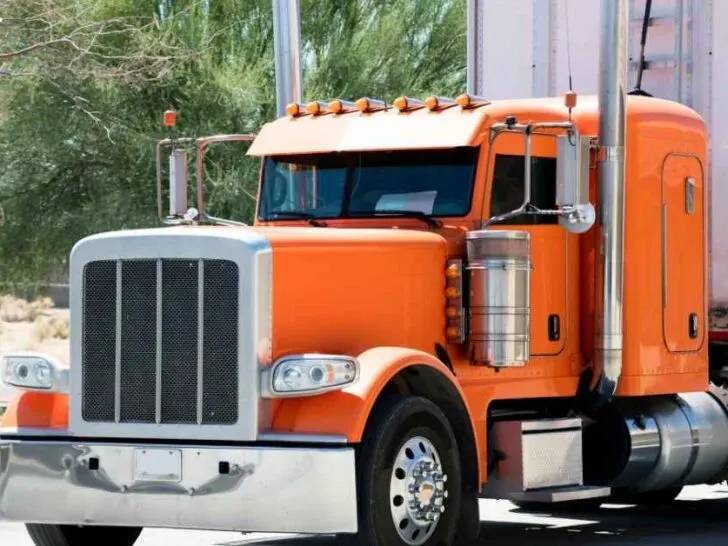Many people try to park a semi-truck in a private residential driveway, but it is legally restricted. A concrete surface cannot withstand the loaded weight of 18-wheels.
Can I Park my Semi Truck in my Driveway? You cannot park your semi-truck in your driveway due to legal restrictions in different states like Pennsylvania, which charges a penalty of $104 to $105 due to violation. Georgia restricts this parking according to ordinance 659, which charges $73 to $75. It is also not allowed in Ohio according to section 351.17 with a penalty of $101 to $102 at the spot, and Texas, Michigan, and New Jersey restrict residential parking. It is illegal because a semi-truck is 19×13 feet with a weight of 11000 to 26000 pounds and blocks the residential area.
In residential locations, the all-night parking of an 18-wheeler is illegal and leads to complaints and costly fines. In addition, due to a semi-truck, the driveways collapse because they only can handle 9000 to 10000 pounds.
Why you cannot park a semi-truck in your driveway?
It is illegal to park a commercial vehicle in a residential driveway. I have explained the following reasons and state policies which restrict such placement.
Legal restrictions
You cannot park or store the commercial truck in the residential driveway because several states of the USA have different rules, fines, and penalties against this condition.
The traffic police and legal authorities of Pennsylvania have strict rules. In such circumstances, you cannot adjust the commercial and heavyweight truck in a private or home driveway.
Violation leads to penalties and on-the-spot fines of about $104 to $105. It is illegal because the vehicle blocks the passage of other road automobiles.
In Georgia, tractor-trailer parking is illegal on a private driveway. In addition, it has a manufacturer weight limitation of about 1.2 tons to 1.6 tons.
According to ordinance 659, a violation leads to a penalty of about $73 to $75. Ohio has laws according to section 351.17 that regulates the adjustment of commercial vehicles in the private, residential and local driveways.
The sudden violation or negligence results in a fee of about $101 to $102.
Texas has laws against such private and storage conditions. However, they allow the loading and unloading conditions in the home for limited durations.
According to 2015 Gloria A, tractor trailers are not allowed to park in the home garages and driveways of Michigan. However, with section 674(1), temporary parking is feasible to avoid conflicts.
With these laws, you can adjust the tractor-trailer in front of the driveway and avoid its internal placement to refrain from violation.
However, New Jersey has different rules about trailers and commercial automobiles. They vary according to the weight specifications, loaded material, and frame construction.
However, you could not adjust a commercial truck in a residential location. In case of violation, the traffic authorities charge you about $100 to $102 at the spot.
A few people challenge the offense and pay more when found guilty of the charge. As a result, the authorities charge them a maximum amount of around $502 to $505.
Commercial vehicles
Semi-trucks are commercial vehicles that attach with a heavyweight trailer. Also, the semi-tractor has an average weight of about 11000 pounds to 26000 pounds.
The limit changes according to the tractor-trailer design, engine power, and towing ability. A trailer has an average length of about 54 feet to 55 feet.
It weighs around 11000 to 12000 pounds with an unladen weight limit of about 36000 to 37000 pounds. The legally allowed weight of a load tractor trailer is 81000 pounds to 82000 pounds.
You cannot park a tractor-trailer of 81000 pounds on a weak, low concrete, residential driveway. The placement and removal of such massive commercial vehicles are challenging.
Across the USA, they are illegal to enter private home garages. According to sections 18-63, you cannot park a commercial tractor-trailer in a private area. However, it does not apply to the delivery, unloading, and loading conditions.
Blockage of residential parking
Residential parking is a particular space allowed by the government to park different automobiles. Nearby residents can adjust their vehicles in these spots temporarily.
However, the placement of a semi-trailer blocks the entrance and removal of these parked vehicles. Also, the blockage affects the flow of traffic and consumes time.
Several tractor trailers cannot enter the gates of these areas. A few enters and lacks the U-turns and removal spots.
They block the passage of crossing vehicles, and you cannot remove a family vehicle without removing the tractor-trailer.
External usage of the driveway
People stop their tractor trailers in the residential driveways without knowing the government laws. In such circumstances, the owner cannot remove the truck with or without an official call to the police.
For loading and unloading, residential spots are available. However, the owner and resident cannot perform these activities without notifying the local authorities.
The external usage of these storage units is illegal. It leads to mysterious activities, transportation of illegal material, and smuggling. A resident cannot provide his living space to adjust an unknown 18-wheeler.
Size of the parking areas
The standard residential driveway has an average length of about 19 feet to 21 feet. It has an average width of around 11 feet to 13 feet.
These are small spots with minimum area. They cannot accommodate such heavy and massive tractor trailers without expanding the boundaries.
Their adjustment requires the alteration of layout and removal of boundaries.
The tractor-trailers make a U-turn with a space of 40.11 to 40.12 feet. The size of these parking spots does not allow the entrance, adjustment, and removal of a semi-truck.
However, the semi-truck damages the gate, walls, and surrounding things of living spots. They cover the entire area, and the residents cannot adjust their vehicles.
Accidents of automobiles
The sudden entry or removal of an 18-wheeler affects the surrounding cars, buses, and other automobiles. As a result, the vehicles and drivers undergo life-threatening accidental conditions.
Such critical activities break the vehicle frames and cause frustration in drivers. In addition, the drivers bump into road obstacles, nearby trees, and nearby objects.
Damage to the driveway
The 18-wheelers are heavy due to their loaded weight and built-in towing capacities. The private driveway consists of concrete, tiny stones, and moderate construction material.
However, it cannot handle the heavyweights of a loaded or empty tractor trailer. As a result, it damages the driveway’s surface by cracking the concrete.
The 18-wheeler generates massive holes and patches on its surface.
The intensity of the cracks depends on the weight of the truck. For example, a concrete-loaded 18-wheeler immediately cracks an already damaged road.
The pre-existing damages, holes, and hairline cracks lead to permanent surface damage. However, the asphalt surfaces are vulnerable to these damages.
They are a combination of sand, stones, and asphalt slurry. They have a protective covering of petroleum-based tar that cannot handle the loaded weight of an 18-wheeler.
Noise and air pollution
The residential parking spots are near the homes and other living locations. The placement of an 18-wheeler in this area causes noise pollution because they have massive engines.
Their built-in motors, heavy tires, and chassis produce loud sounds. In addition, the start and acceleration generate unwanted noises that affect the walkers and surrounding residents.
People complain about noise pollution to the local authorities. The relevant department takes immediate action against the house owner and driver of the semi-truck.
However, they charge hundreds of dollars and take the matter to the courts.
The tractor-trailers produce toxic fumes that evaporate harmful gases and smoke. These components pollute the fresh air, reduce aspiration activities, and cause suffocation and several diseases.
The USA residents do not tolerate this violation and complain to the environmental control authorities.
The inspection team investigates the issues and connects with the legal management of the district and private parking authorities.
In such circumstances, the driver and homeowner pay penalties. The legal authorities compel the driver to remove the 18-wheeler from the private storage unit.
Complaints about parking
The nearby residents complain about the illegal parking in the private home driveways. They directly send these complaints to the official authorities.
Due to this fear, the owner of the tractor-trailer avoids the violation. During the night conditions, they stop the 18-wheeler in these locations.
However, the surrounding people observe the entry and removal of this massive truck outside the living spots. Furthermore, they keep the contact numbers of the local authorities, identify suspicious activities, and inform the native offices.
In such a way, they protect themselves and their neighborhood from theft and other crucial conditions.
When can I park my semi-truck in my driveway?
Due to legal restrictions, you cannot park them in the residential driveways and garages.
In such circumstances, the authorities check their reason, weight of the truck, loaded material, and duration of the placement.
Several businesses use these 18-wheelers to transport goods, heavy material, freight, chemicals, and hazardous material.
The entrepreneurs get these permissions to load and unload the tractor trailers from these homes.
In such conditions, the 18-wheeler can park on the private driveways according to their weight holding capacity and the surface condition.
The call for service allows the parking for these massive vehicles in these spots. Such tractor-trailers require repairing and remodeling.
The owners inform the authorities, coordinate with the traffic policies and place their 18-wheelers before the U-turn. In emergencies, such placements are beneficial because the damaged semi-truck can damage the surrounding vehicles.
In such circumstances, the driver should take permission according to the repairing time because remodeling requires a few hours.
During this period, complaints do not affect the driver and residents. Also, the local authorities cannot charge penalties to drivers due to legal notices.
Related Articles:

